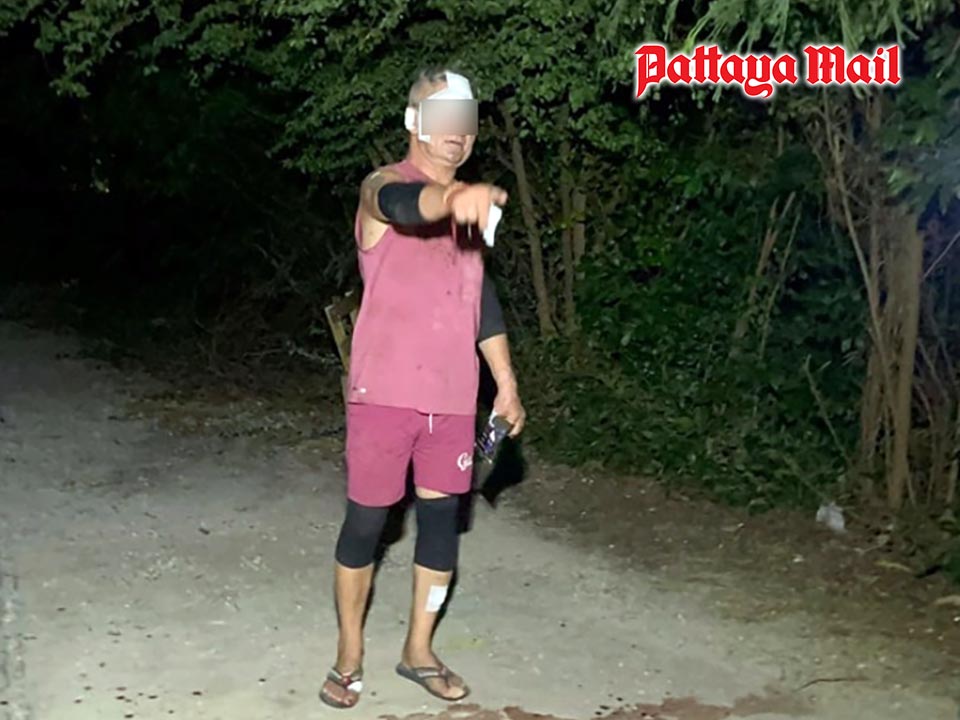
WWW.PATTAYAMAIL.COM
Pattaya crime wave highlights urgent need for patrols, street lighting, and surveillance cameras
Pattaya’s Dark Side: Russian tourist attacked and robbed in forested alleyway, sparking outcry for better safety measures.
PATTAYA, Thailand – A disturbing surge in nighttime assaults has once again drawn attention to the urgent need for improved public safety infrastructure in Pattaya. The most recent incident, involving a Russian tourist who was brutally attacked and robbed in a dark alley, underscores growing public concern over the city’s lack of street lights, security cameras, and regular police patrols.
The incident occurred in the early morning hours of June 9, when Mr. Viacheslav Gurov, a 54-year-old Russian national, arrived at the Pattaya City Police Substation in the Dongtan Curve area to file a formal complaint. According to Capt. Phuttharak Sonkamhan, the investigating officer, Mr. Gurov reported that he had been violently assaulted and robbed while walking near a wooded area along Soi Parkland 7, behind Wat Boonyakanaram in Jomtien area.
According to a statement given by Mr. Gurov’s wife, the attack took place the previous morning, on June 8, when Mr. Gurov had entered the forested area to relieve himself and smoke a cigarette. It was then that he was approached by a man accompanied by a child. The man struck him with a weapon, rendering him unconscious, and proceeded to steal his belongings. Mr. Gurov could not recall exactly what was taken due to the trauma and confusion following the assault. After regaining consciousness some time later, he managed to find help from nearby friends and his wife, who accompanied him to file the police report.
Capt. Phuttharak has since coordinated with Pattaya City Police investigators to search the area and begin gathering evidence. The commanding officer, Pol. Col. Anek Srathongyu, has been notified and is overseeing efforts to identify and apprehend the perpetrators.
This incident has sparked a wave of public outcry on social media, where residents and long-term visitors expressed a mix of fear, frustration, and anger. Many were shocked that such a violent crime could take place in what is technically considered part of the city, yet resembles an overgrown, deserted woodland path at night. Some locals remarked that the area becomes dangerously quiet after just 9 or 10 PM, with barely any pedestrians and no police presence in sight. Female tourists, especially those from Russia, are frequently seen walking the area in shorts or dresses, and many residents fear they could become easy targets for attackers.
The commentary has not been limited to this one case. Many residents have shared personal experiences and observations, claiming that Pattaya is no longer the safe city it once was. Some said they now avoid walking at night entirely, especially in dimly lit or secluded areas. Others pointed out that Thailand’s laws against violent robbery are not nearly as strict as those in many Western countries, where such a crime would carry a heavy sentence. In Pattaya, they say, criminals too often get released only to reoffend.
Assault in the Shadows: Violent mugging of tourist highlights urgent need for lights, patrols, and cameras in Pattaya.
One particularly disheartened local, who said the crime happened just outside his condominium, lamented that these incidents are becoming far too frequent. Having lived in Pattaya since 1984, he observed that the rapid development of the city over the past few decades has unfortunately been accompanied by a rise in street crime, often fueled by drugs, poverty, and inadequate law enforcement.
Some also voiced anger toward what they see as government inaction, criticizing Thailand’s political and legal systems for failing to adapt to growing urban challenges. A few commenters went as far as to mock recent viral videos by foreign content creators portraying Thailand as one of the “safest countries in the world,” asking rhetorically whether those claims still hold up when tourists are getting knocked unconscious in central Pattaya just for walking alone.
Others took a more pragmatic tone, advising both tourists and locals to avoid walking alone at night, especially through unlit shortcuts or forested paths. Several warned of a disturbing new trend in which robbers travel on motorcycles with full-face helmets to avoid identification, and emphasized that until laws are tightened and enforcement improves, these attacks will likely continue.
At the heart of the public’s frustration lies a basic truth: the attack on Mr. Gurov is not an isolated event. It is part of a larger, worsening pattern that Pattaya’s authorities can no longer ignore. Many residents believe that had there been functioning streetlights or visible security cameras in the area, the attack might have been prevented—or at least the perpetrators might now be identifiable.
Although police have pledged to step up patrols and review coverage in high-risk zones, critics argue that these promises are too little, too late. They say the city needs more than just reactive enforcement. What Pattaya requires now is a comprehensive, proactive plan that includes lighting all darkened streets and alleyways, installing surveillance systems in known problem areas, and ensuring that police officers are seen regularly in vulnerable neighborhoods, not just after crimes have occurred.
As the sun sets on yet another day in Pattaya, many residents and tourists alike are left wondering what it will take for safety to become more than just a campaign slogan. For now, too many walk in fear—through streets that are too dark, past corners too quiet, with too few eyes watching. And until that changes, incidents like this one will keep happening, chipping away at the trust and reputation the city once enjoyed.
0 ความคิดเห็น
0 เเชร์
60 ครั้ง


